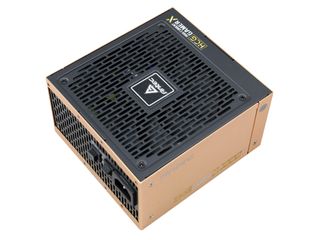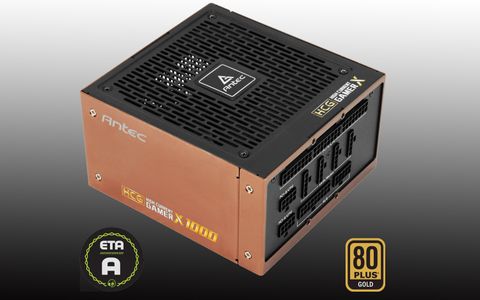Tom's Hardware Verdict
Here in the U.S., Antec's HCG1000 Extreme sells for $149. That's a great price compared to competing 1000W power supplies with 80 PLUS Gold efficiency ratings. As a result, this model deserves attention from anyone shopping for high performance and unique aesthetics.
Pros
- +
Great performance per dollar ratio
- +
Quiet for a high-capacity 80 PLUS Gold PSU
- +
Fully modular
- +
6x PCIe and 2x EPS connectors to support high-end workstations
- +
Fluid dynamic bearing fan should last a long time
- +
10-year warranty
- +
Distinctive external design
Cons
- -
Big voltage drops on the 3.3V rail during our transient response tests
- -
Failed one of our EMI tests
- -
Short distance between peripheral connectors complicates installation
- -
Our sample's semi-passive mode didn't work properly
Why you can trust Tom's Hardware
Features & Specifications
Antec's 1000W High Current Gamer Extreme power supply is a feast for the eyes. Its gold and glossy finish are unlike anything we've seen before. Under the hood, Antec utilizes a Seasonic Focus Plus Gold platform, so we already know that this PSU serves up high performance and long-term reliability. We hoped that an Extreme descriptor would indicate Seasonic's higher-end Prime platform. But we're also glad to see such a capable model selling for $150, and a Prime-based version would have cost a lot more.
As it stands, the HCG1000 Extreme is about $10 cheaper than Seasonic's own Focus Plus Gold (SSR-1000FX). It sports a much more attractive exterior, a larger 135mm fan, and more connectors. Inside, the two PSUs are identical, and their warranties are the same. So, if you have to pick between them, Antec's offering is the obvious choice. Corsair's RM1000x and EVGA's SuperNOVA 1000 G3 are interesting alternatives with similar capacities and 80 PLUS Gold efficiency certifications. Both are more expensive, though.
The HCG Extreme family currently consists of 850W and 1000W members. While we like that Antec hit a $149 price point with its 1000W model, the 850W version is too expensive at $139. The HCG850 Extreme should sell for $120 or $125 to effectively compete with Seasonic's Focus Plus Gold 850 and Corsair's RM850x, or even Antec's own HCG850 Gold, which is available for less than $110.

Specifications
| Manufacturer (OEM) | Seasonic |
|---|---|
| Max. DC Output | 1000W |
| Efficiency | 80 PLUS Gold, ETA-A (88-91%) |
| Noise | LAMBDA-A- (25-30 dB[A]) |
| Modular | ✓ (fully) |
| Intel C6/C7 Power State Support | ✓ |
| Operating Temperature (Continuous Full Load) | 0 - 50°C |
| Over-Voltage Protection | ✓ |
| Under-Voltage Protection | ✓ |
| Over-Power Protection | ✓ |
| Over-Current (+12V) Protection | ✓ |
| Over-Temperature Protection | ✓ |
| Short Circuit Protection | ✓ |
| Surge Protection | ✓ |
| Inrush Current Protection | ✓ |
| Fan Failure Protection | ✗ |
| No Load Operation | ✓ |
| Cooling | 135mm fluid dynamic bearing fan (HA13525H12F-Z) |
| Semi-Passive Operation | ✓ (selectable) |
| Dimensions (W x H x D) | 152 x 87 x 162mm |
| Weight | 1.67 kg (3.68 lb) |
| Form Factor | ATX12V v2.4, EPS 2.92 |
| Warranty | 10 years |
The HCG1000 Extreme earns 80 PLUS Gold and ETA-A efficiency certifications, plus a LAMBDA-A- noise rating on Cybenetics' scale. That's pretty good for a 1000W power supply crammed into such compact dimensions.
All of the protection features we expect from a desktop PSU are accounted for, and Antec's FDB-based fan promises enhanced reliability and lower noise output compared to a double ball bearing fan. Antec does claim there's a semi-passive mode able to stop the fan from spinning under light loads, but the feature wasn't working properly on the sample we tested.
A 10-year warranty matches the coverage you'd get from Corsair or EVGA in this price range.
Power Specifications
| Rail | 3.3V | 5V | 12V | 5VSB | -12V | |
|---|---|---|---|---|---|---|
| Max. Power | Amps | 25 | 25 | 83 | 3 | 0.3 |
| Watts | 125 | 996 | 15 | 3.6 | ||
| Total Max. Power (W) | 1000 |
The +12V rail is powerful; it can deliver up to 83A of current. Moreover, the combined power of the minor rails is sufficient for any modern PC. Finally, the 5VSB rail has 3A of maximum current output.
Cables & Connectors
| Modular Cables | ||||
|---|---|---|---|---|
| Description | Cable Count | Connector Count (Total) | Gauge | In Cable Capacitors |
| ATX connector 20+4 pin (550mm) | 1 | 1 | 18-22AWG | Yes |
| 4+4 pin EPS12V (650mm) | 2 | 2 | 16AWG | Yes |
| 6+2 pin PCIe (550mm) | 4 | 4 | 18AWG | Yes |
| 6+2 pin PCIe (550mm+100mm) | 2 | 4 | 18AWG | Yes |
| SATA (400mm+90mm+90mm+90mm) | 2 | 8 | 18AWG | No |
| Four-pin Molex (500mm+100mm+100mm+100mm) | 1 | 4 | 18AWG | No |
| SATA (400mm+90mm+90mm+90mm) / Four-pin Molex (+100mm+100mm) | 1 | 4 / 2 | 18AWG | No |
| FDD Adapter (+105mm) | 1 | 1 | 22AWG | No |
| AC Power Cord (1400mm) - C13 coupler | 1 | 1 | 16AWG | - |
There are two EPS and eight PCIe connectors, which are plenty for a 1000W power supply. The number of SATA connectors is increased as well, while a sextet of four-pin Molex connectors should cover most densely-packed PCs. Antec also includes a FDD adapter in its cable bundle.













MORE: Best Power Supplies
MORE: How We Test Power Supplies
MORE: All Power Supply Content

Aris Mpitziopoulos is a contributing editor at Tom's Hardware, covering PSUs.
-
richardvday I am very curious why so many 1000W or larger PSU's ? How many of these do they actually sell ? How many people need a 1000w PSU ? 500-600W seems the sweet spot that most people would need. I have an 850W that I have been kicking myself in the head for ever since really. I need 500W so my efficiency sucks, wasting energy.Reply -
totalinsanity4 PSUs are actually most efficient when you're at about half load, so people with 500-600W loads will actually be seeing a slightly lower power bill with a 1000W PSU than, for instance, a 650W oneReply -
crmaris modern PSUs featuring LLC resonant converters also have good efficiency under light loads regardless capacity, given that their design is good. With LLC Burst Mode efficiency under light loads vastly improves.Reply
